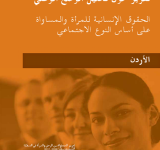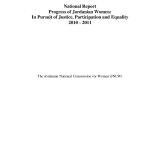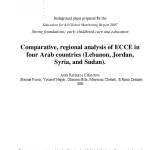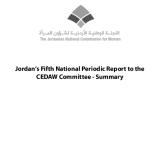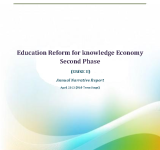استراتيجية
This national report is designed to trace the progress of women in various fields;; monitoring achievements;; and highlighting gaps and failures;; as well as analyzing indicators;; recommending measures;; and measuring levels of achievements in the implementation of plans and strategies. The main themes were selected according to national priorities dictated by each stage: Legal Protection for Women's Right to Access Justice;; Participation;; the Economic Empowerment of Jordanian Women;; Equality;; Citizenship and Decision-Making in Public Life. The conclusions of this report confirm that a much smaller effort was exerted at the level of providing information;; data and the provision of services in the area of providing justice and facilitating ways of achieving it. The lack of knowledge about available services among women;; whether provided by civil society organizations or government institutions;; affects women's ability to access justice negatively. Regarding the economic participation the Policies and plans that targeted empowering women economically show that the result of these policies was weak and limited. Difficulty of women’s access to job opportunities in the private sector and inequitable pay between the sexes;; lack of supporting services to working women;; including childcare Facilities;; poor matching between education outputs and skills required in the labor market and the traditional social standards that contribute to directing females towards certain professions. The report proposed general recommendations and directions that include quick solutions to deal with the main highlighted challenges.
This report provides an overview of the status of early childhood care and education (ECCE) in Jordan;; Lebanon;; Sudan;; and Syria. It examines the contextual factors influencing ECCE;; highlighting current policies;; challenges;; and strategies for improvement and expansion. The report underscores the paucity and limitations of available data. Findings show that ECCE services have improved but regional disparity and dominance of the private sector prevail. None of the four countries but Jordan has a full-fledged national strategy and policy on ECCE. Challenges identified include lack of qualified teachers;; societal misconceptions about the unique features of early childhood;; and lack of research-based studies. Innovative projects show that NGOs have been instrumental in addressing the needs of marginalized children.
هذا التقرير يستعرض جميع السياسات والتشريعات والممارسات والاجراءات الوطنية لبيان مدى اتفاقها مع الالتزامات المبنية في اتفاقية القضاء على جميع اشكال التمييز ضد المرأة;; بالاضافة إلى القاء الضوء على مساهمة المرأة في التنمية السياسية والاقتصادية والاجماعية. اضافة إلى ذلك;; فإن هذا الملخص يعرض الانجازات والتحديات ذات الصلة بحقوق المراة في مجال المساواة وعدم التمييز التي وردت في التقرير على صعيد: المشاركة في الحياة العامة;; محور التشريعات ;; محور الأمن البشري والحماية الاجتماعية;; ومحور التمكين الاقتصادي;; ومحور الاعلام.
The second phase of the Program Education Reform for the Knowledge Economy Program (ERfKE II) continues to build on the achievements of the first phase and follow the same implementation arrangements that have proven to be successful in (ERfKE I);; and in the same time;; focuses on schools as the locus of change as well as on the need to enhance capacity building at the central and field levels. The development objective of (ERfKE II) is to provide students enrolled in pre-tertiary education institutions in Jordan with increased levels of skills to participate in knowledge economy. Also the Mid-Term review highlighted the concrete progress achieved by (ERfKE II) in several key areas related to policy development;; quality of education interventions and school construction;; and identified the key issues as a summary of the overall progress that will be tackled and addressed during the remaining stage of implementation.
